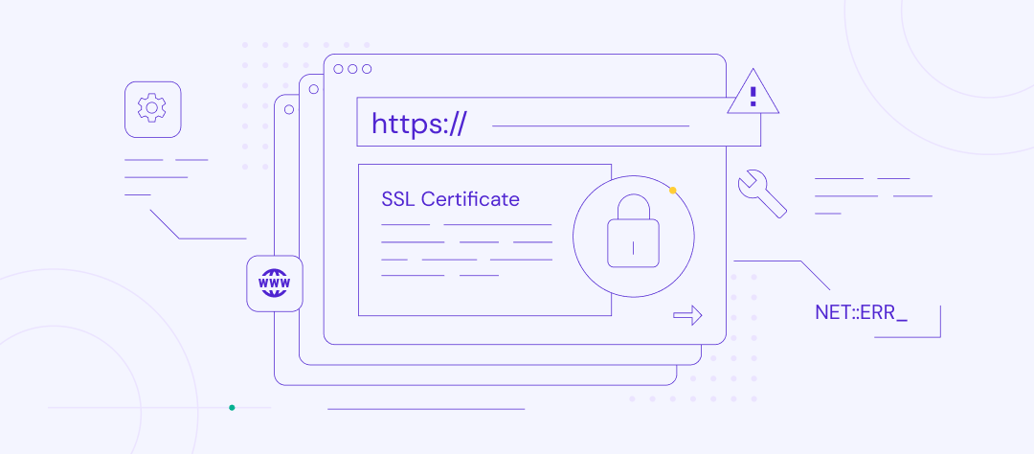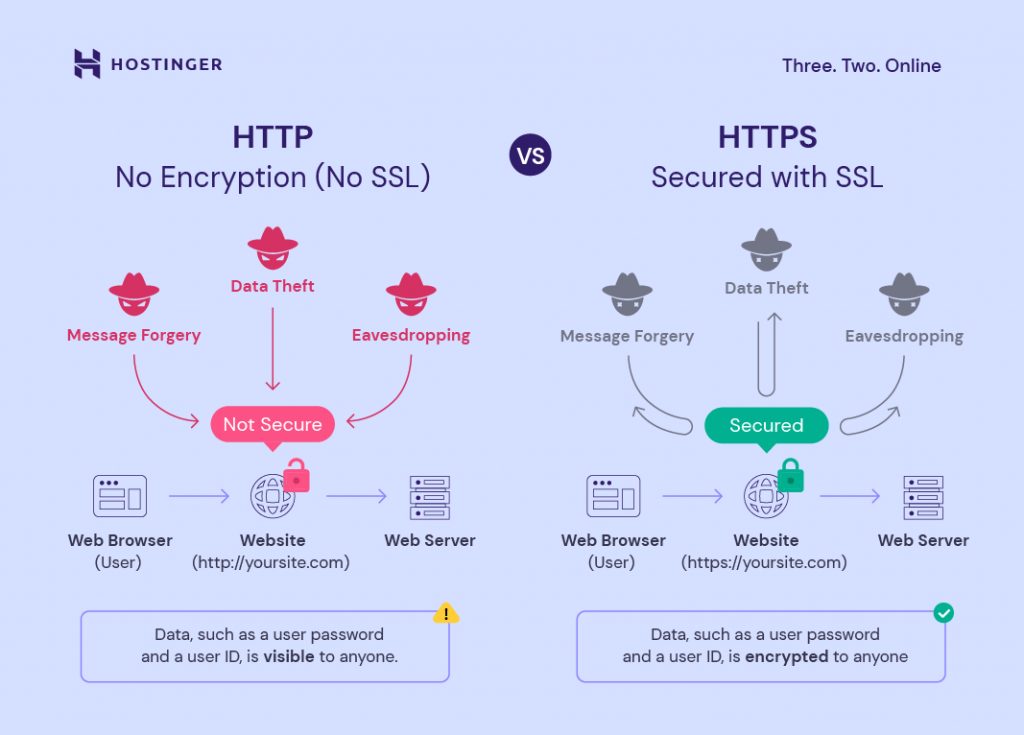Oct 03, 2025
Domantas G. & Brian
5min Read

Secure Sockets Layer (SSL) is a protocol that establishes an encrypted connection between a web browser and a server. This encryption prevents attackers from intercepting sensitive information such as passwords, payment details, or personal data.
Although SSL has been succeeded by Transport Layer Security (TLS), the term “SSL” is still commonly used to describe the certificates that power secure HTTPS connections and signal trust to website visitors.
SSL works by initiating a handshake between the browser and the server to agree on encryption methods, exchange cryptographic keys, and generate a secure session key.
This process encrypts all communication, while the SSL/TLS certificate issued by a trusted Certificate Authority (CA) verifies the website’s authenticity and prevents impostors from misleading users.
Different types of SSL certificates are available based on the number of domains they protect and the level of validation they provide.
In terms of validation, SSL certificates include Domain Validated (DV), Organization Validated (OV), and Extended Validation (EV), which offer increasing levels of trust.
For broader domain coverage, you can use wildcard certificates to secure a domain and all its subdomains, or multi-domain/Unified Communications certificates to protect multiple domains under a single certificate.
Continue reading for a closer look at how SSL works, its different types, and the steps to install it on your website.
Download glossary for web beginners
SSL certificates protect data transfer using two different encryption techniques: asymmetric and symmetric.
Asymmetric encryption uses two separate keys: a public key and a private key. The public key encrypts the message, which can only be decrypted by the private key, and vice versa.
On the other hand, symmetric encryption uses one shared key, or a pair of keys, to encrypt and decrypt the message.
To give you a better understanding of how those SSL encryption techniques work, here’s an overview of the process:

Once the SSL protocol has been enabled, the website is secure and encrypted. Unauthorized third parties can no longer intercept its communication.
You can check whether a website uses the SSL protocol by clicking the View site information icon in Google Chrome.
The panel will display Connection is secure if the site has an active SSL certificate. You can click on this text for more details about the digital certificate, such as the issuer and validity date.

Conversely, your browser will display a warning for non-HTTPS sites, stating that the connection isn’t secure.
SSL is what makes HTTPS possible. When SSL is installed, it enables Hypertext Transfer Protocol Secure (HTTPS), which encrypts the data exchanged between a browser and a server.
This matters because data transmission on the web relies on communication protocols – most commonly Hypertext Transfer Protocol (HTTP) and its secure counterpart, HTTPS.
Without an SSL certificate, a website can only run on HTTP, transmitting data in plain text. This leaves all information – including sensitive details like passwords or payment information – vulnerable to interception. Cybercriminals can exploit this exposure to carry out data breaches, identity theft, or other malicious attacks.

The main benefit of installing an SSL certificate on your site is that it encrypts the data exchanged between your website and its visitors, ensuring that only the intended recipient can decrypt and access the information.
This is especially important if your site handles sensitive information such as usernames, passwords, or credit card numbers, making SSL a must-have for secure data exchange.
Additionally, as web browsers warn people to avoid accessing unsecured sites, installing an SSL certificate is in your best interest to make your website secure and trustworthy. This way, visitors can instantly see that your site is reliable.

Yes, an SSL certificate influences SEO. Google has confirmed that HTTPS is a lightweight ranking signal, which means it can act as a tiebreaker between two otherwise equal websites.
That said, it’s important to note that SSL isn’t as impactful as high-quality content or backlinks in making your site rank high on search engines.
Beyond the direct ranking benefits, SSL certificates enhance user trust. A secure site indicated by HTTPS reassures users that their data is protected, leading to improved engagement and potentially better SEO outcomes.
Additionally, SSL certificates preserve referral data in analytics tools. When traffic moves from an HTTPS site to another HTTPS site, the referral information remains intact, allowing for more accurate tracking and analysis.
So, while an SSL certificate may not drastically boost your SEO rankings, it contributes to a secure user experience, builds trust, and supports accurate analytics. These factors will positively influence your site’s performance in search results.
SSL certificates vary in the number of domains they protect and the level of validation they provide.
Based on the number of domains they protect, here are the main SSL types:
SSL certificates can also be classified by their level of validation, which determines how thoroughly the certificate authority verifies the organization or domain owner:
When selecting an SSL certificate type, consider your site’s size, the sensitivity of the data you handle, and the level of trust you want to convey to your visitors.

There are several ways to install an SSL certificate, and many web hosting providers make the process straightforward. You can secure your website with just one click, eliminating most technical steps.
With Hostinger, all web hosting and Cloud hosting packages include a free lifetime SSL certificate installed by default. So, every new domain, subdomain, and parked domain you add to your account is automatically secured.
Alternatively, you can install any of your preferred SSL certificates that you obtain from a Certificate Authority (CA), such as Let’s Encrypt, DigiCert, or Comodo.
First, uninstall the default SSL by going to Websites → Security → SSL from hPanel. Click the three-dot button on the active domain, and choose Uninstall.

After that, proceed to install the custom SSL of your choice.
The process involves generating a Certificate Signing Request (CSR), submitting it to the CA for verification, and then downloading and installing the signed certificate on your website.
Next, you can force HTTPS to ensure all traffic is encrypted by adding a small snippet to your site’s .htaccess file.
Note that if you choose to install a custom SSL certificate, you’ll be responsible for managing its renewal. Make sure to keep track of the expiry date to avoid any security warnings or downtime on your site.

Transport Layer Security (TLS) is the modern, more secure successor to SSL, with the same core purpose of encrypting communication between a browser and a web server.
TLS was created to improve SSL by providing stronger encryption, better performance, and ongoing updates to keep up with current security standards.
Although SSL is now outdated, the term is still widely used in the industry. In most cases, when you see references to “SSL certificates” or “SSL connections,” they actually mean TLS, which powers HTTPS connections today.
For a deeper dive, explore our comprehensive guide on what TLS is and how it works.
All of the tutorial content on this website is subject to Hostinger's rigorous editorial standards and values.
Comments
February 28 2022
Good
March 14 2022
Best
April 26 2022
Dear Hostinger, I just bought a 48-month website purchase to start my own website but in the way I had to make connection with Nameserver but also the SSL. I would like to have some help to make this succesfully done, can you help me with this? Thank you, Hayaan
May 04 2022
Hi there Hayaan! I understand you've already managed to change the nameservers, right? If not, you can follow our guide for pointing your domain. If you're setting up our lifetime SSL, you can find step-by-step instructions for it over here ;) If you run into any issues with anything, feel free to reach out to our Customer Success team as well!
September 01 2022
I recently purchased a new domain, could you please give me EXTRA the SSL Certificate?
September 02 2022
Hey there! We offer free unlimited SSL certificates for all active domains and subdomains that are added to your hosting plan! You can check out this article to learn how to install the Lifetime SSL on your new domain! ?